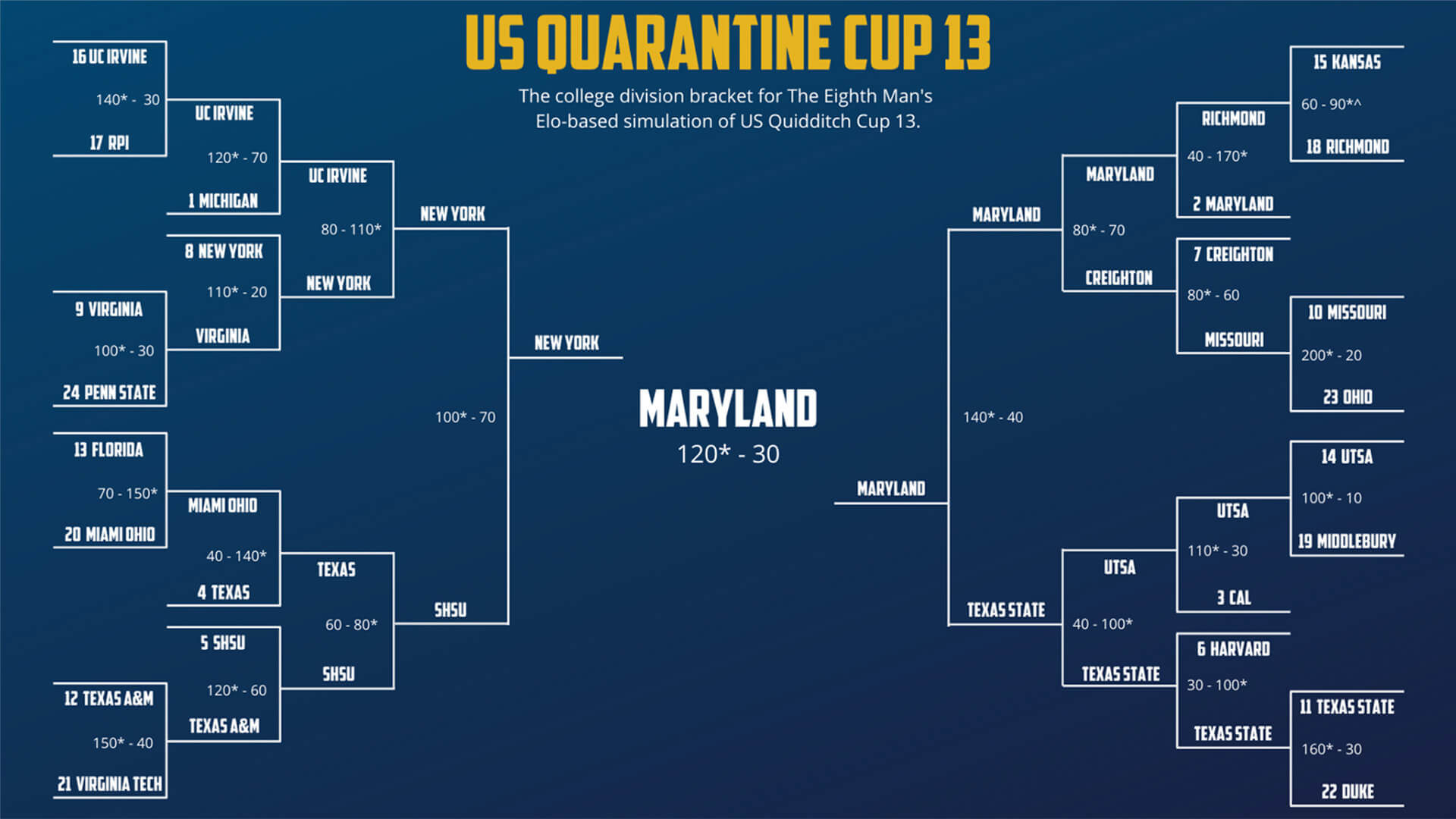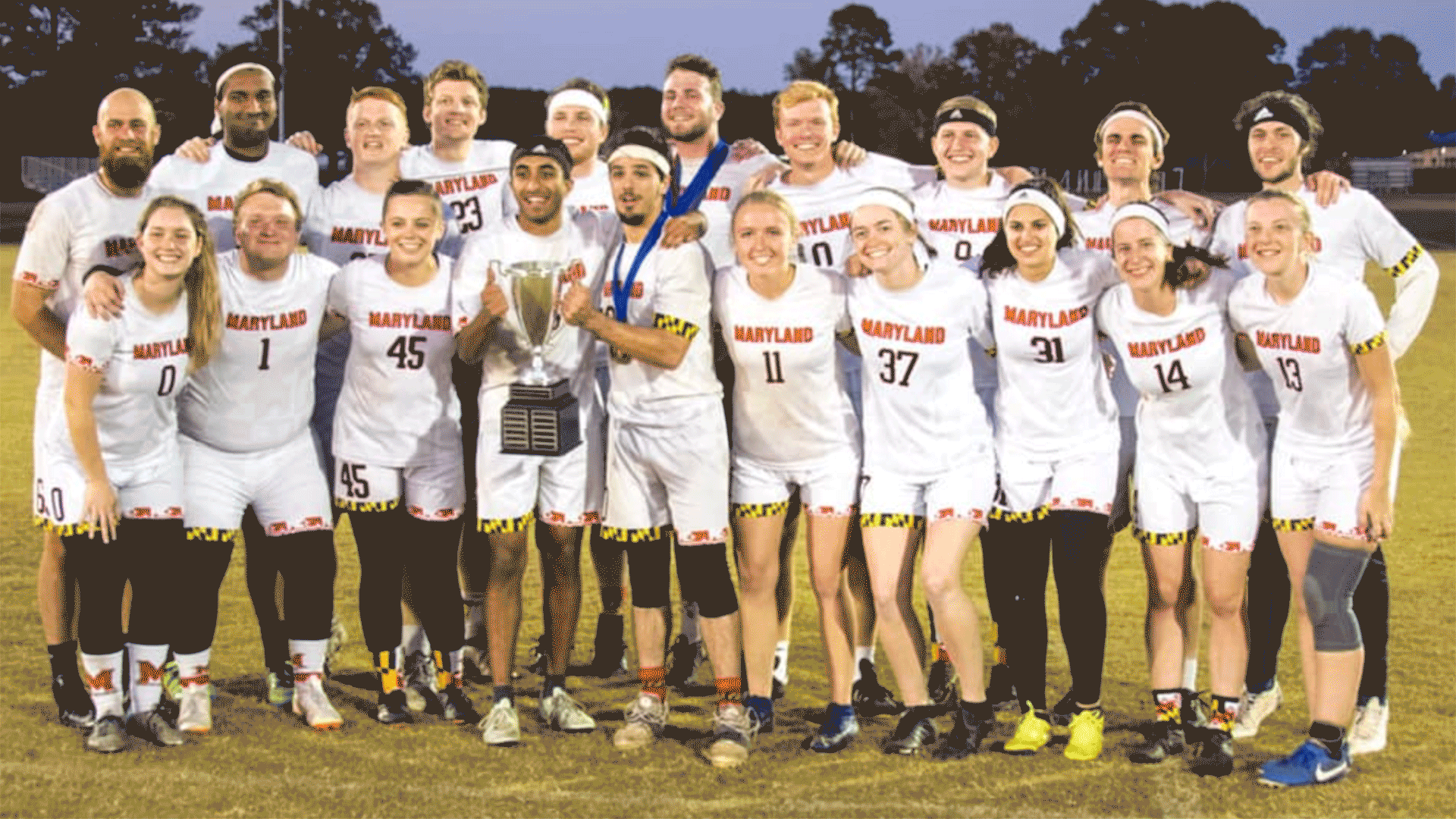- April 28, 2020
- By Annie Krakower
As the COVID-19 pandemic spread quickly across the globe, sports everywhere were forced to scratch their biggest events: March Madness, the Boston Marathon, this summer’s Olympic Games in Tokyo.
Also on that list: the U.S. Quidditch Cup.
No, not the fictional competition enjoyed by Harry Potter and his high-flying, broomstick-riding friends—the gritty, full-contact and fully grounded version of the sport that college and club teams across the country play. On the real-world field, the nationally ranked Terps are magically good.
But when the Quidditch Cup’s cancelation cut off Maryland’s path to its first national title, the Eighth Man, a Quidditch coverage website, offered a slight solution. The outlet created a virtual tournament dubbed the Quarantine Cup, and after simulating each round, UMD soared to victory—not quite the same as an official championship, but a small way to recognize Maryland’s dominant season.
 “For me, it was really exciting, but I had to kind of hold myself back because we didn’t actually win an award or anything like that,” said UMD co-captain John Sheridan ’20. “The team really deserved to win.”
“For me, it was really exciting, but I had to kind of hold myself back because we didn’t actually win an award or anything like that,” said UMD co-captain John Sheridan ’20. “The team really deserved to win.”
The non-wizarding version of the sport pits co-ed teams of seven against each other as they try to score 10-point goals by throwing the quaffle (in this case, a volleyball) through one of three hoops—all while straddling PVC pipe “brooms.” Pushing, tackling and hurling bludgers (dodgeballs) at opposing players are all fair game. After 18 minutes, the snitch—a yellow-clad neutral player with a Velcro tail attached to their shorts—is released, and players called seekers must grab the tail to score 30 points and end the game.
The Terps had gone 17-1 this season, winning their fourth straight Mid-Atlantic regional title to advance to the U.S. Quidditch Cup in Charleston, W.Va. But as the coronavirus outbreak became more of a public health threat, U.S. Quidditch postponed the tournament and then announced its full cancelation on April 2.
“We were planning on going there and winning the national championship. We had a really good team to do it this year, and we’ve never quite made it to the championship game itself,” Sheridan said. “(The cancelation) was really deflating, especially for our seniors.”
Those feelings were shared across the sport, prompting Joshua Mansfield, head of gameplay for Major League Quidditch and editor at the Eighth Man, to spearhead a virtual solution. A stats guru, he’d already been working on an Elo-based system—which creates ratings based on past performance, with wins over better teams or by larger margins boosting a team’s ranking—to predict how teams would fare in the national tournament.
When the cancelation was announced, Mansfield adapted that model to focus less on prediction and more on simulation. He created 10 full tournament simulations, and in order to reduce bias and add another layer of randomization, fans and players could vote on scenarios labeled 1–10 to determine the Quarantine Cup winner.
“Quidditch follows a very similar season to college basketball. The same way March Madness was canceled and left big question mark—it felt very similar in Quidditch,” Mansfield said. “We wanted to as best as possible answer some of those ‘what ifs.’”
The simulated tournament ran from March 30–April 19, with the Eighth Man tweeting out scores and recaps that included quotes from players as if they were real game stories. (“It’s so great to have the real champ and the people’s champ aligned,” Maryland player Mack Morgan told the Eighth Man for its championship game recap.) UMD defeated New York University in that contest, earning virtual revenge against the team that knocked them out in the in-person quarterfinals last year.
“From a historical perspective, Maryland has always been one of the better teams in the sport,” Mansfield said. “Even though it was virtual, it was kinda fun to see this year’s team show at least on paper that they had that potential, that this was the year that they were able to come out on top.”
The Terps followed along on their way to the computerized crown, messaging each other in the team’s GroupMe chat and retweeting posts about the simulated games, even trash-talking a little. They somewhat jokingly added “2020 National Champions” to their Twitter bio after the virtual victory, but they know it’s not official—at least, not this season.
“We’ll be ready to actually win a national championship next year, that’s for sure,” Sheridan said. “We will still have a high-powered team, one of the best in the nation.”
Topics
Campus & Community